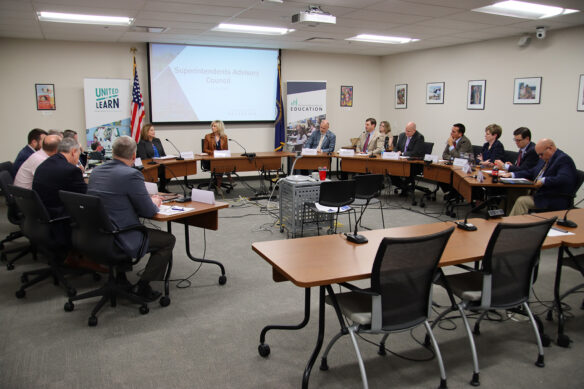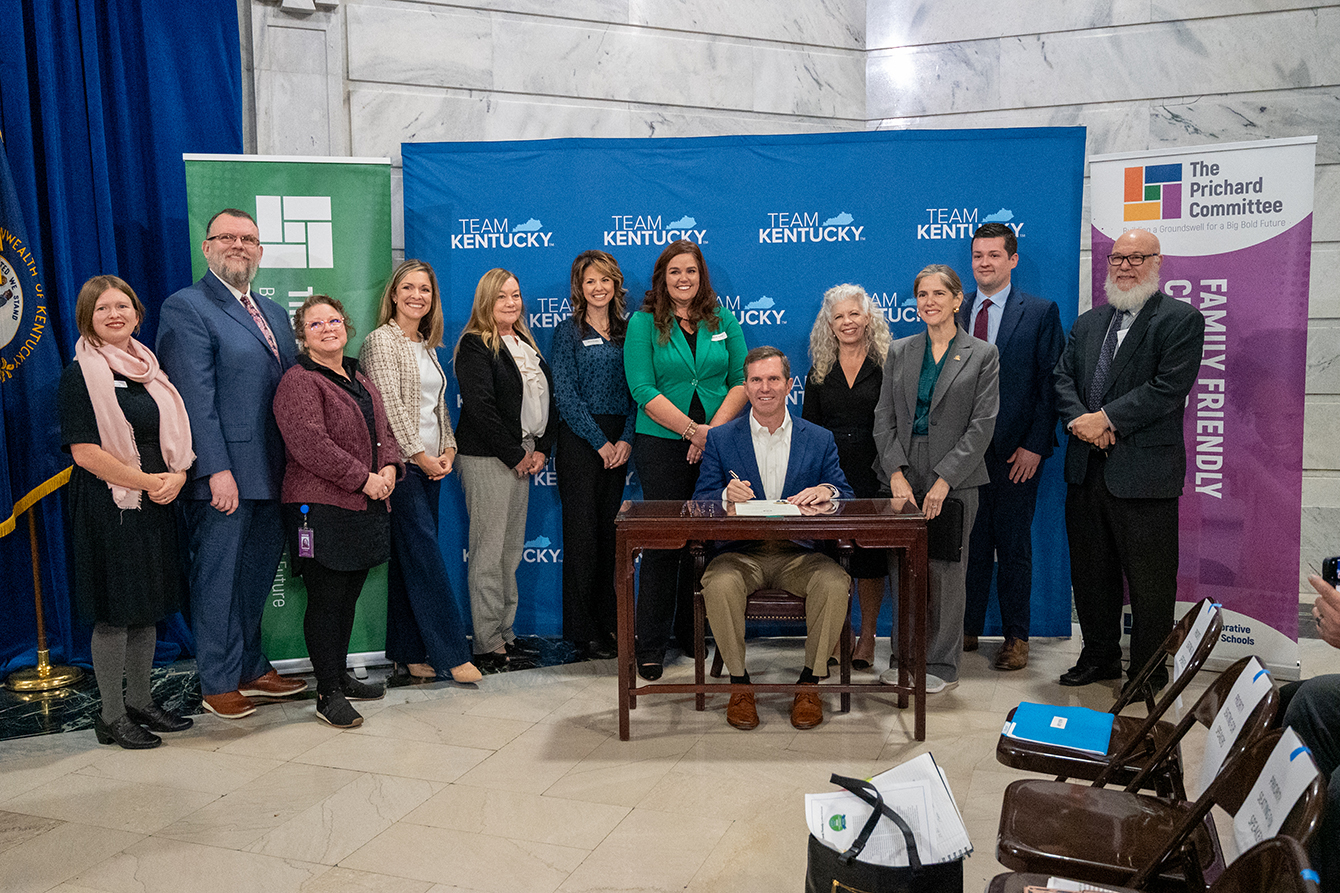
The Superintendents Advisory Council met on Feb. 21. Photo by Joe Ragusa, Kentucky Department of Education, Feb. 21, 2024
(FRANKFORT, KY) – The Superintendents Advisory Council discussed the current legislative session and ongoing budget talks during the council’s meeting on Feb. 21.
Matt Ross, associate commissioner in the Kentucky Department of Education (KDE) Office of Finance and Operations, broke down what the current legislative budget proposals meant for KDE and school districts.
House Bill (HB) 6, filed by Republican legislative leaders, represents the current working draft of the budget and includes increases to per-pupil funding and transportation in the Support Education Excellence in Kentucky (SEEK) formula. Funding for full-day kindergarten is also included.
The proposal, which currently sits in the Kentucky Senate after House lawmakers passed it earlier this month, does include new requirements and suggestions:
- Districts are required to prominently display information on reading and math proficiency, while KDE is required to post a rank order by overall performance on its website;
- Local school districts are encouraged to provide certified and classified staff members a salary or compensation increase; and
- Failure to implement reporting requirements or to make adequate progress in recruitment and retention of staff may lead to either school closures or the takeover/consolidation of local school boards.
KDE made several additional budget requests representing the priorities of the Kentucky Board of Education to lawmakers, and while some of them – like money for assessments, content standards and educators employment liability insurance – were met, others were not included in the current budget proposal.
Interim Commissioner of Education Robin Fields Kinney pointed superintendents to one area she’s particularly worried about: the Kentucky Education Technology System (KETS). KDE requested an additional $74 million in each of the next two fiscal years, but at a bare minimum, she said the Commonwealth’s schools need at least $14.6 million more in each of the next two years.
Kinney says technology needs grew immensely during the COVID-19 pandemic and haven’t gone away.
“It is the way we work now. It is how schools run,” she said. “We have to have technology. We have to have the appropriate bandwidth so that you all can do what you need to do.”
Other Legislative Topics
Brian Perry, KDE’s director of government affairs, spoke to the council about the ongoing legislative session.
Kentucky lawmakers passed the midway point of the session earlier this month, but Perry said he doesn’t expect the final version of the budget until just before lawmakers adjourn for the end of session on April 15.
Perry also detailed several pieces of legislation superintendents need to be aware of, including Senate Bill 8, which would make positions on the Kentucky Board of Education subject to local partisan elections rather than gubernatorial appointment.
Other bills making their way through the general assembly deal with transportation, numeracy, artificial intelligence and disciplinary matters, among many other subjects. As of Feb. 21, 883 bills have been filed by House and Senate lawmakers, and the deadline to file a bill is next week: Feb. 26 in the House and Feb. 28 in the Senate.
SEEK Funding
KDE also updated lawmakers on school funding through the Support Education Excellence in Kentucky (SEEK) formula. The SEEK program is a formula-driven allocation of state-provided funds to local school districts for costs, including transportation and help for low-income and special needs students.
KDE Division of District Support Director Chay Ritter said funding typically fluctuates because of changing property assessment and student population data each year. If a county sees increased property valuations, there could be a reduction in dollars through the SEEK funding formula because the county is expected to collect more dollars through local taxes. The issue several superintendents spoke about is that they could still end up losing money even with the increase in local property assessments.
Calculations for the SEEK funding formula also factor in average daily attendance. Attendance data used to calculate SEEK funding had been frozen during the COVID-19 pandemic, but that is no longer the case for this school year and moving forward.
Casey County Superintendent Barry Lee said he expects a large increase in property assessments, but due to the way the formula works and because their average daily attendance has gone down, he expects to see a massive cut in state funding, and he said the SEEK increase in HB 6 would not be enough to make up for it.
“I think the hardest part to explain to legislators or anyone, even (local school) board members, is we’re going to get more locally, but we’re going to get eaten alive with (the corresponding loss in the state SEEK formula),”
Ritter emphasized however that there may be ways to “claw back” some of that money through various provisions in state law.
In recent years, lawmakers have discussed potentially reforming the SEEK funding model. House Concurrent Resolution 60 this year would establish the Support Education Excellence in Kentucky (SEEK) Task Force, which would study the various components of the SEEK funding formula and submit any findings and recommendations by Dec. 1.
The next Superintendents Advisory Council meeting is scheduled for May 15.



I believe some schools should have at least 1 special needs classroom, instead of putting kids with disabilities in regular classroom with regular students, this would eliminate, billing, fighting and students laughing at students with disabilities, also each classroom shows have at least 2 teachers in each class for support, so students who needs help can get the help they need to progress in education